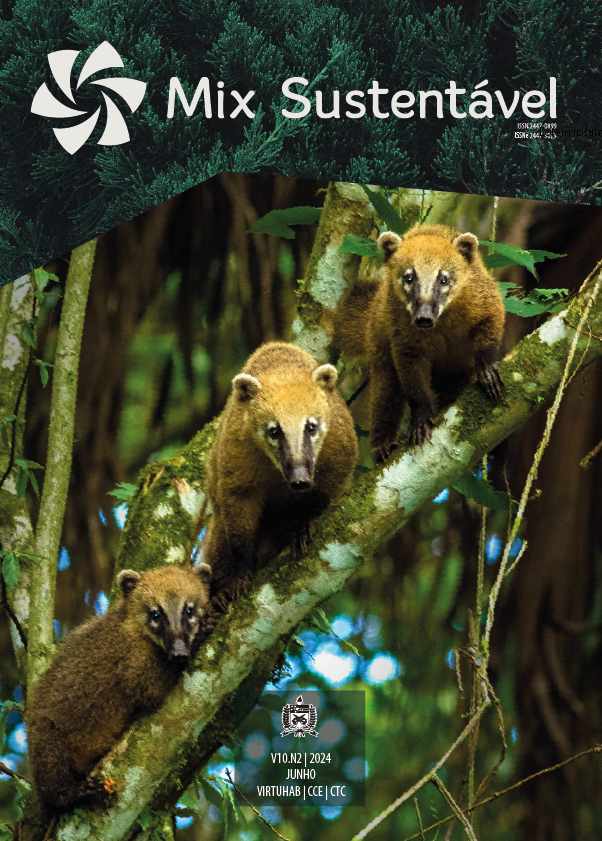UMA EXPERIÊNCIA DE DESIGN SOCIAL: CRIAÇÃO E PRODUÇÃO DE LANTERNAS DE BAMBU NO CONTEXTO DA UNIVERSIDADE E COMUNIDADE LOCAL
BAMBOO LANTERN FESTIVAL - A SOCIAL DESIGN EXPERIENCE INTEGRATING THE UNIVERSITY AND THE LOCAL COMMUNITY
DOI:
https://doi.org/10.29183/2447-3073.MIX2024.v10.n2.17-27Palavras-chave:
Design Social, Bambu, Educação para sustentabilidadeResumo
Environmental degradation and global social inequality require an education focused on transforming values and practices in today's world. Bamboo, both as a plant and a material, has mitigated the impacts of climate change. Combined with design within a bamboo productive chain, it also enhances the possibility of a pedagogical dimension for design students and the participation of local communities. This study aims to examine how social design can collaborate in education for sustainability, involving the researcher’s participant observation and co-creation, which resulted in the Take Akari Bamboo Lantern Workshop, held at the Unesp Campus in Bauru/SP. Results show that social design combined with bamboo helps in motivating people to internalize and carry out new practices due to the collaborative and collective ways of working collectively based on which it was held, and is capable of transforming scenarios and changing beliefs and values.
Referências
CHENÉ, A. The Concept of Autonomy in Adult Education: a philosophical discussion. Adult Education Quarterly, v. 34, n. 1, p. 38-47, 1983.
DEWEY, J. Arte como experiência. 3. ed. São Paulo: Martins Fontes Editora Livraria, 2010.
DISALVO, C. et al. The collective articulation of issues as design practice. CoDesign, v. 7, n. 3-4, p. 185-197, 2011.
GALÁN, B. La episteme del proyecto: consideraciones sobre el conocimiento proyectual en el sistema de la ciencia y de la tecnologia. In: GALÁN, B. (Ed.). Diseño, proyecto y desarrollo: miradas del período 2007-2010 en Argentina y Latinoamerica. 1. ed. Buenos Aires, Argentina: Wolkowicz Editores, 2011. p. 75-102.
IKEDA, C.; MISHIRO, K. Take-Akari, Bamboo Lights, as New Japanese Culture. Chikaken, 2021. Available at: https://chikaken.com/english/. Accessed on: Sept. 21, 2021.
INGOLD, T. Da transmissão de representações à educação da atenção. Revista Educação, v. 33, n. 1, p. 6-25, 2010.
KOSKINEN, I. Agonistic, Convivial, and Conceptual Aesthetics in New Social Design. Design Issues, v. 32, n. 3, p. 18-29, 2016.
LEE, W. Whose Festival is it? Patterns of participation in the Japanese Matsuri. Paragrana, v. 22, n. 1, p. 165-179, 2013.
MAREIS, C. The Epistemology of the Unspoken: On the Concept of Tacit Knowledge in Contemporary Design Research. Design Issues, v. 28, n. 2, p. 61-71, 2012.
MATSUMOTO, E.; GUIOTOKO, R. Training new facilitators for Japan-Brazil exchange: Bamboo, the Revitalization of a Community. São Paulo-SP: Japan Foundation of São Paulo, 2020.
MUNARI, B. A arte como ofício. 4. ed. Lisbon: Editorial Presença, 1993.
RANJAN, M.; LYER, N.; PANDYA, G. Traditional wisdom: Bamboo and cane crafts of northeast India. 1. ed. Ahmedabad, India: National Institute of Design, 2004.
SAFOUTIN, M. J. et al. A Design Attribute Framework for Course Planning and Learning Assessment. IEEE Transactions on Education, v. 43, n. 2, p. 188-199, 2000.
UMEKI, H. Usuki Takeyoi Festival. Oitaisan, 2017. Available at: http://oitaisan.com/english/heritage/usuki-takeyoi-festival/. Accessed on: Aug. 17. 2023.
UNITED NATIONS. Flagship UN study shows accelerating climate change on land, sea and in the atmosphere. UN, 2020. Available at: https://news.un.org/en/story/2020/03/1059061. Accessed on: Aug. 17. 2021.
Downloads
Publicado
Edição
Seção
Licença
Copyright (c) 2023 Silvia Sasaoka, Marco Antonio dos Reis Pereira, Cyntia Santos Malaguti de Sousa

Este trabalho está licenciado sob uma licença Creative Commons Attribution 4.0 International License.
Aviso de Direito Autoral Creative Commons
1. Política para Periódicos de Acesso Livre
Autores que publicam nesta revista concordam com os seguintes termos:
a. Autores mantém os direitos autorais e concedem à revista o direito de primeira publicação, com o trabalho simultaneamente licenciado sob a Licença Creative Commons Attribution que permite o compartilhamento do trabalho com reconhecimento da autoria e publicação inicial nesta revista.
b. Autores têm autorização para assumir contratos adicionais separadamente, para distribuição não-exclusiva da versão do trabalho publicada nesta revista (ex.: publicar em repositório institucional ou como capítulo de livro), com reconhecimento de autoria e publicação inicial nesta revista.
c. Autores têm permissão e são estimulados a publicar e distribuir seu trabalho online (ex.: em repositórios institucionais ou na sua página pessoal) a qualquer ponto após o processo editorial, já que isso pode gerar alterações produtivas, bem como aumentar o impacto e a citação do trabalho publicado (Veja O Efeito do Acesso Livre).




